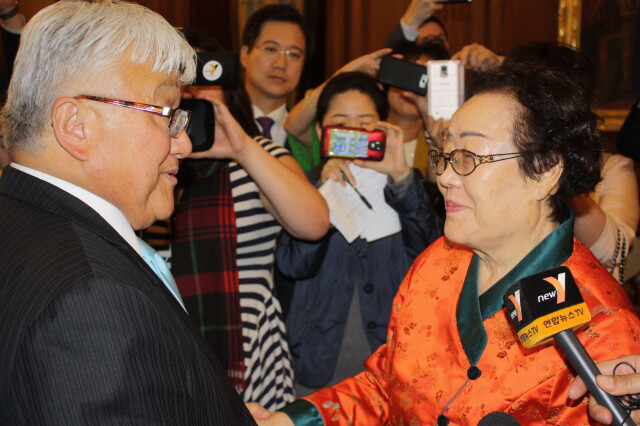hankyoreh
Links to other country sites 다른 나라 사이트 링크
Members of US congress urge Abe to apologize

On Apr. 21, four members of Congress one after the other stood behind the podium in the chamber of the House of Representatives, located in the US Capitol in Washington, D.C. It is here that Japanese Prime Minister Shinzo Abe is scheduled to deliver his address on Apr. 29.
While the official session of Congress had ended for the day, these representatives had asked to make special topic speeches to urge Abe seize his address as an opportunity to make a sincere apology for the past actions of Japan.
“Enough is enough. Seventy years later, it’s time for Prime Minister Abe to be clear and unequivocal and issue an irrefutable apology,” said Mike Honda (D-CA). “He can make a full, unequivocal and formal apology on behalf of the Japanese government.”
The white-haired representative thundered in such an ear-splitting voice that the Speaker of the House left the room.
Noting that some people say that Japan has apologized enough and that it is time to move forward, Honda said, “To those people, I would say, given [its] continued revisionist attempts, for every step forward toward peace and reconciliation, the government of Japan takes two steps backwards.”
Honda also criticized the Japanese government for rejecting House Resolution 121, adopted in 2007, in which the US House of Representatives urged Japan to acknowledge and officially apologize for forcing young women to become sex slaves and to adequately educate future generations on the matter.
Honda’s speech on Tuesday attracted even more attention because Lee Yong-soo, 87, a former comfort woman who testified before a congressional hearing in 2007, was in the audience. Lee, who arrived in the US on Apr. 19, was listening to the speech in the public gallery with staff from the Washington Coalition for Comfort Women Issues and Kim Dong-suk, founder of Korean American Civic Empowerment (KACE).
Honda described the terrible things that Lee had experienced as a comfort woman in 1944. “This woman is one of less than a hundred people who survive today of more than 200,000 comfort women in the Asia-Pacific region. Not only Lee but also the tens of thousands of souls who have already left this world are still waiting for peace and justice,” he said, bringing a hush to the room. Honda’s speech lasted for 20 minutes.
The remaining three representatives briefly expressed their points using the one-minute speech system. All of the representatives urged Abe, as the first Japanese Prime minister to address a joint session of Congress, to make the most of this historic opportunity.
In his remarks, Rep. Steve Israel (D-NY) said that Abe “must be honest” about Japan’s wartime history and its brutal record with sex slaves, warning that ignoring its past would “ensure a very troubling future.”
“These wounds need to be closed. They need to be healed and Prime Minister Abe can do that closure, can do that healing by exposing those wounds to the light of the truth and an apology, and I‘m hopeful that he will do this on this floor when he addresses us next week,” Israel said.
Rep. Bill Pascrell (D-NJ) said he hopes that Abe will “lay the foundation for healing and humble reconciliation by addressing the historical issue of the comfort women.”
Rep. Charles Rangel (D-NY) asked Abe to use the speech to restore the honesty that Japan had built up since the war.
By Park Hyun, Washington correspondent
Please direct questions or comments to [english@hani.co.kr]

Editorial・opinion
![[Column] Season 2 of special prosecutor probe may be coming to Korea soon [Column] Season 2 of special prosecutor probe may be coming to Korea soon](https://flexible.img.hani.co.kr/flexible/normal/500/300/imgdb/original/2024/0426/3317141030699447.jpg) [Column] Season 2 of special prosecutor probe may be coming to Korea soon
[Column] Season 2 of special prosecutor probe may be coming to Korea soon![[Column] Park Geun-hye déjà vu in Yoon Suk-yeol [Column] Park Geun-hye déjà vu in Yoon Suk-yeol](https://flexible.img.hani.co.kr/flexible/normal/500/300/imgdb/original/2024/0424/651713945113788.jpg) [Column] Park Geun-hye déjà vu in Yoon Suk-yeol
[Column] Park Geun-hye déjà vu in Yoon Suk-yeol- [Editorial] New weight of N. Korea’s nuclear threats makes dialogue all the more urgent
- [Guest essay] The real reason Korea’s new right wants to dub Rhee a founding father
- [Column] ‘Choson’: Is it time we start referring to N. Korea in its own terms?
- [Editorial] Japan’s rewriting of history with Korea has gone too far
- [Column] The president’s questionable capacity for dialogue
- [Column] Are chaebol firms just pizza pies for families to divvy up as they please?
- [Column] Has Korea, too, crossed the Rubicon on China?
- [Correspondent’s column] In Japan’s alliance with US, echoes of its past alliances with UK
Most viewed articles
- 1‘We must say no’: Seoul defense chief on Korean, USFK involvement in hypothetical Taiwan crisis
- 2After election rout, Yoon’s left with 3 choices for dealing with the opposition
- 3Why Kim Jong-un is scrapping the term ‘Day of the Sun’ and toning down fanfare for predecessors
- 4AI is catching up with humans at a ‘shocking’ rate
- 5Two factors that’ll decide if Korea’s economy keeps on its upward trend
- 6[Column] Park Geun-hye déjà vu in Yoon Suk-yeol
- 7Division commander ordered troops to enter raging flood waters before Marine died, survivor says
- 8Gangnam murderer says he killed “because women have always ignored me”
- 9South Korea officially an aged society just 17 years after becoming aging society
- 10No good, very bad game for Korea puts it out of Olympics for first time since 1988